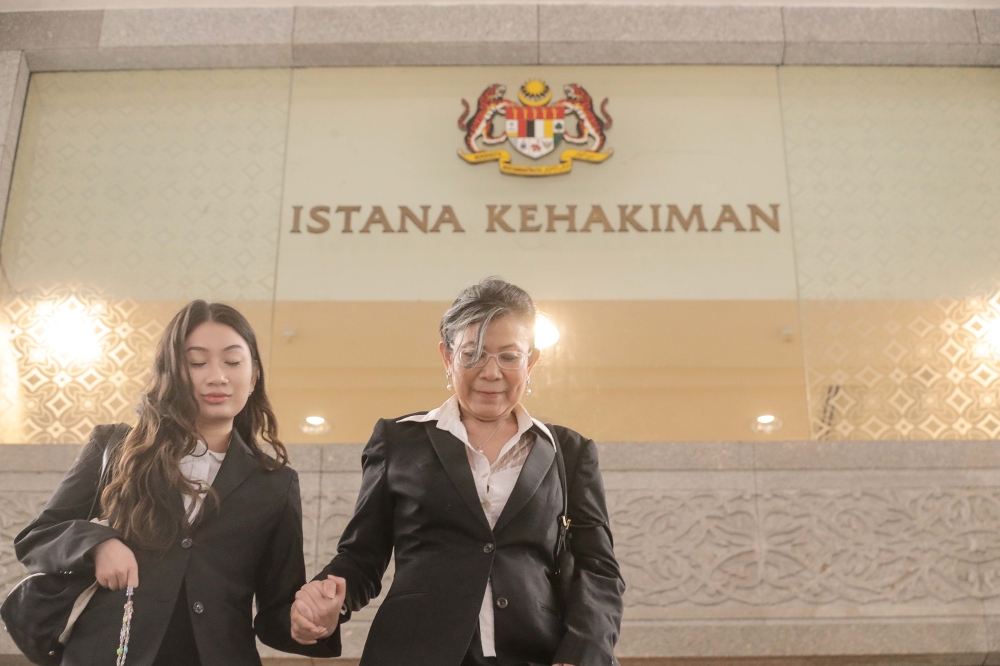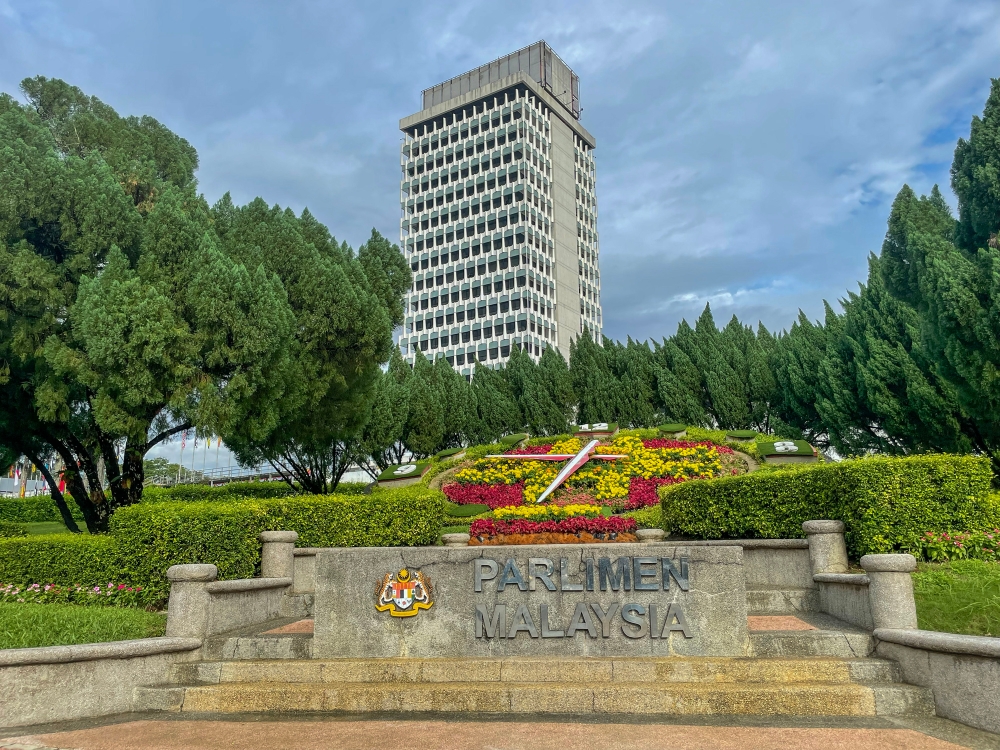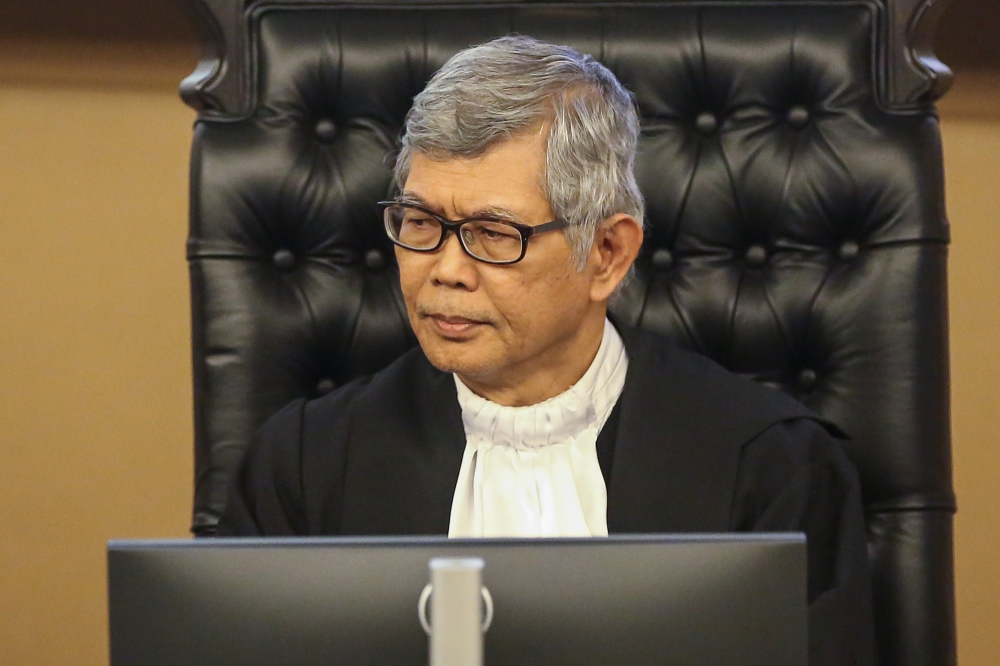KUALA LUMPUR, March 22 — Kelantan is trying to bring back 16 provisions on Shariah criminal offences that were declared invalid by the Federal Court, but what happened before that?
The short answer about the 8-1 decision: The Federal Court sat as a nine-judge panel, with the majority or eight judges deciding that the 16 provisions in a Kelantan state law were unconstitutional and invalid as the state had no power to make these laws. Only one judge disagreed by saying the two Malaysian Muslim women who challenged the provisions did not even have legal standing to file the challenge in the first place.
But why and how did the Federal Court reach its decision in this case (commonly known as the ‘Nik Elin’ case)? Was it ever about religion or not?
Here’s a quick summary by Malay Mail of everything you need to know, based on the 87-page majority judgment and 72-page minority judgment:
Wait, what laws are we talking about?
In May 2022, Kelantan-born lawyer Nik Elin Zurina Nik Abdul Rashid and her daughter Tengku Yasmin Nastasha Tengku Abdul Rahman filed a constitutional challenge at the Federal Court over 20 offences in the Kelantan Syariah Criminal Code (I) Enactment 2019. (This state law applies only in Kelantan and only to Muslims.)
After conceding that two of the 20 challenged provisions (Section 5 on false claim and Section 37(1)(a) criminalising gambling or being found in a gambling place regardless of whether the person gambles) are constitutional, they later trimmed the list down to 18 provisions in the Kelantan state law.

Naming the Kelantan state government as the respondent, the two women argued the 18 provisions were invalid as only Parliament had the powers to make criminal laws.
Out of the 18 Shariah provisions, the Federal Court’s majority decision ruled that 16 are unconstitutional, and the two other provisions are presumed to be constitutional.
Here’s what the Federal Court’s majority decision says
Chief Justice Tun Tengku Maimun Tuan Mat, who chaired the nine-judge panel, delivered the brief summary of the majority decision on February 9. Her full judgment was made available earlier this month.
The majority judgment written by the chief justice was agreed to by seven judges: President of the Court of Appeal Tan Sri Abang Iskandar Abang Hashim, then Chief Judge of Malaya Tan Sri Mohamad Zabidin Mohd Diah; Federal Court judges Tan Sri Nallini Pathmanathan, Datuk Mary Lim Thiam Suan, Datuk Harmindar Singh Dhaliwal, Datuk Nordin Hassan and Datuk Abu Bakar Jais.
It’s not about Islam, it’s purely about lawmaking powers under Federal Constitution
Just before diving into the key issue, the Federal Court took the time to address allegations and public controversy related to the case, stressing that this constitutional challenge had nothing to do with religion but was instead about the law.
“The record must be set straight. The present case, contrary to erroneous and politically-fuelled suggestions, has absolutely nothing to do with undermining the religion of Islam,” the chief justice said, and further dismissed allegations that any Federal Court decision could destroy or uphold Islamic law in Malaysia as this was not what this case is about.
The chief justice made it clear that the only issue in this case is actually whether Kelantan — via the Kelantan state legislature — was constitutionally empowered to make the 18 disputed provisions. Or in other words, which is the correct legislative body to make these laws: Parliament or the Kelantan state legislature?
“The petition has nothing to do with the substantive principles of Islamic law or its position in this country,” she said.
Let’s clear the three preliminary issues
The Federal Court dismissed Kelantan’s bid to put an end to the court case on technical grounds, such as whether the two Muslim women with Kelantan ties could file the challenge and whether they had named the right respondent for the case.
1. Locus standi (Latin for legal standing)
Disagreeing with Kelantan’s first preliminary objection, the Federal Court decided that the duo have locus standi to file this case, and that this case is not academic nor abstract. (More on this later.)
2. Who should be party to the case
The Federal Court dismissed the Kelantan state government’s second preliminary objection, which claimed the two women had failed to name the correct party to the case (the Kelantan state legislature or the Kelantan Islamic Religious Affairs Department (Jaheaik)) that is responsible for enforcing the 18 provisions.
The Federal Court said this court challenge is over the power to make the disputed provisions and not about the enforcement of these laws, also ruling that the state legislature can be made a party for “completeness” but not naming it as a respondent would not be fatal to the case.
Citing the Federal Constitution’s Article 4(3) and 4(4) requirements, the Federal Court said the Kelantan state government is the correct party to be named as respondent for such court challenges against the invalidity of laws due to lack of lawmaking powers, and ruled that the Kelantan state government can be the sole respondent for this case as it is sufficient to name it as a party.
3. ‘Expert’ opinions on how to interpret Constitution?
The Federal Court expunged or completely removed the Kelantan state government’s three court documents — which contained “expert” opinions on the constitutional interpretation of the 18 disputed provisions and which alluded to what “precepts of Islam” are derived from and include. The court said these documents have no bearing on the case’s outcome.
The Federal Court stressed that only the courts are entitled to interpret the Federal Constitution based on legal points, and that “expert” opinion is not an accepted method of constitutional interpretation.
“In any event, the Islamic principles of aqidah, syariah or akhlak are not matters for our consideration,” the chief justice said when noting the contents of the “expert” opinion, pointing out again the Federal Court instead has to decide whether the Kelantan state legislature went beyond its lawmaking powers under the Federal Constitution.
Go beyond how the Kelantan provisions are packaged, check what they really are about in substance
Under the Federal Constitution’s Ninth Schedule, there are three main legislative lists (or lists that tell you who has the power to make what type of laws): List I - Federal List, List II - State List, and List III - Concurrent List.
Parliament can make laws on any matters listed in the Federal List, while state legislatures can make laws on any matters listed in the State List. The Concurrent List states the areas that both Parliament and state legislatures can make laws on.
The two women’s lawyers had argued that Kelantan has no power to make the 18 provisions in the state law as there are already existing federal laws dealing on the same subject matter, and had even provided a table to compare the 18 provisions with their federal law equivalent.
On the other hand, Kelantan argued that the 18 provisions are different from the federal laws cited by the duo.
Citing an 2021 precedent in the Iki Putra case, the Federal Court described the approach of comparing federal laws with state laws — to decide whether the state can make state laws based on whether federal laws exist on the same matter — as “simplistic” and incorrect.
Instead, the Federal Court said the correct approach is to look at a law as a whole: In substance, does the law deal with a subject matter that the legislature has power to make law on?
The Federal Court said “it is not the outward appearance of the law in question and the words it uses that matter”, but instead stressed on determining what a law is really about.
Correcting two misconceptions about “criminal law”
Here’s how the Federal Court corrected two misapprehensions or misunderstandings:
Mistaken belief #1: States can make any law (even if it deals with criminal law) if there is no federal law dealing with that issue. Or even if there is federal law on criminal matter, states can still make state criminal law if it is worded differently or achieves the same outcome via different means.
Mistaken belief #2: States can make any law as long as it deals with precepts of Islam. (Related to mistaken belief #1 that even if there is an existing federal law on the same matter, state law will be validly made as long as it deals with the same issue from Islamic perspective and Islamic precepts lens.)
Remember the Federal List which tells us what Parliament has power to make laws on? List I’s Item 4 broadly states “civil and criminal law and procedure and the administration of justice” as something within the federal legislature’s lawmaking powers.
As for the State List or List II, Item 1 has a long paragraph on what state legislatures can make law on for Muslims, including “Islamic law and personal and family law of persons professing the religion of Islam”; and “mosques or any Islamic public places of worship, creation and punishment of offences by persons professing the religion of Islam against precepts of that religion, except in regard to matters included in the Federal List”.
The Federal Court describes the phrase “except in regard to matters included in the Federal List” as a preclusion clause to the State List’s Item 1.
So what does all this mean? It means that Parliament is the one that has powers to make “criminal law” (under the Federal List), while state legislatures like Kelantan’s can make laws on religious crimes (unless these offences fall under Parliament’s lawmaking powers in the Federal List).
Based on the Federal Constitution’s structure and also the report of the Reid Commission which was mainly responsible for the Constitution’s creation, the Federal Court said Parliament has the main or primary powers to make laws, while states are given limited powers to also make laws (including on matters relating to Islamic law/ offences against the precepts of Islam).
The Federal Court suggested that Malaysia’s multiracial and multireligious society meant the country’s general criminal law needed to apply equally to all persons regardless of race or religion and this lawmaking power was given to Parliament, while saying that the intention behind the State List’s Item 1 was to give powers to states to make laws “only to offences that are purely religious in nature” or “offences that relate purely to the precepts of Islam and nothing else”.
“The other reason why the Federal Constitution was drafted in this way is so that Muslims would not be subject to different laws and legal systems for the same offences when compared to non-Muslims for example on general laws like rape, corruption, theft, robbery, etc,” the Federal Court said.
While many criminal law offences (such as theft, robbery, rape and corruption) would naturally also go against the precepts of Islam, the Federal Court said only Parliament has the power to make such laws as such offences fall within the “criminal law” category, and that this is based on the Federal Constitution’s separation of the lawmaking powers between Parliament and the state legislatures.
So can states make law on offences (which should be laws made by Parliament) by “disguising” the state laws as offences that deal with precepts of Islam, and can such state laws co-exist with federal criminal laws on the same subject? The answer would be no, based on the Federal Court’s decision.

Please give me the TLDR version
Here’s a simplified version of the Federal Court’s approach:
1. Is the offence in the state legislature’s disputed provision an “offence against the ‘precepts of Islam”?
Yes, it is an offence against precepts of Islam if it falls under two broad categories:
1st category:
In substance, these offences fall under matters specifically mentioned in State List’s Item 1 or other applicable Federal Constitution provisions (e.g. Article 11(4) where state law may control/restrict propagation of religious doctrine/belief among Muslims) + this law only applies to Muslims = It is a religious offence and it is validly enacted by the state legislature as it clearly falls under the State List.
2nd category:
Purely religious offence (relating to (i) aqidah (creed); (ii) sanctity of Islam or its institutions, (iii) purely relating to morality in Islam)
2. If it is a religious offence, is it in substance under the Federal List or State List (is it Parliament or state legislatures that have the power to make this law)?
a. It is a “purely religious offence”, if it does not fall under Federal List and it only applies to Muslims/enacted only for purposes of Islamic law or religious reasons / confined only to Islam (E.g. someone claims he is a Prophet.)
Conclusion: The state legislature has power to make this law. The state-legislated offence is valid.
b. It is not a “purely religious offence”, if it is a religious offence but in substance falls under Federal List’s “criminal law” or is considered “general criminal law” (with element of public order/safety/health/security/morality, etc.) that applies equally to everyone in the country. (E.g. murder, theft, robbery, corruption)
Conclusion: Parliament is the one with power to make this law. The state-made offence is invalid.
The Federal Court’s majority judgment then went through a detailed analysis of all the 18 Kelantan provisions being challenged to determine if they were actually matters that fall under the Federal List or federal legislature’s lawmaking powers instead:
Here’s what the dissenting judge said
Before going into what the only judge on the nine-member panel said, let’s take a look at why the two women filed their court challenge directly at the Federal Court.
That’s because under the Federal Constitution’s Article 128(1)(a), the Federal Court has exclusive jurisdiction to decide whether a law is invalid because Parliament or a state legislature has no power to make that law.
The Federal Constitution’s Article 4(3) allows for court challenges seeking to declare Parliament-made law or state-made law as invalid (based on Parliament’s or a state legislature’s lack of powers to make that law); while Article 4(4) requires such court challenges to first get leave or permission from a single judge in the Federal Court and that the federal government and the related state would be entitled to be part of this court case.
On September 30, 2022, Federal Court judge Datuk Vernon Ong Lam Kiat agreed that the two women should be given leave or allowed to proceed to have their court challenge heard and decided by the Federal Court.
In his minority judgment, Chief Judge of Sabah and Sarawak Tan Sri Abdul Rahman Sebli agreed with Kelantan’s application to set aside the September 2022 leave order granted by the Federal Court.
In short, Abdul Rahman viewed the two women as having no locus standi (legal standing) and thus lacking the right to even bring their case to the Federal Court, and said this would mean the actual court challenge should not even be heard and decided by the court.
The judge added that the two women’s court challenge is an “abuse of the court process” which should be struck out, saying that the Federal Court should not have granted leave to them in the first place.
In this case, Nik Elin had mentioned facts such as being Kelantan-born and her frequent travels to Kelantan where she has family members and properties and her intention to retire there as well as her daughter’s frequent travel to the state and her residential address there.
But the judge viewed those facts as not being related to the issue as he said the disputed Kelantan legal provisions apply to every Muslim whether they are Kelantanese or not and are not specific to the two women, and viewed the only factual point as being related as Nik Elin’s comments of the “real risk” of being subjected to Kelantan’s investigative powers on the challenged provisions.
But as Nik Elin only mentioned this risk at the leave stage and not at the stage when the actual court challenge was being heard by the Federal Court, the judge viewed that this left the two women “without any factual basis to support their claim for locus standi or standing to sue”.

The judge said the court should not grant leave to “busybodies”, and that the requirement for leave for such court challenges was to prevent frivolous proceedings from starting.
In order to show they have locus standi to pursue this court challenge, the judge said the two women first have to show that there is an arguable violation of their constitutional rights, and that there exists a “real and actual controversy” between them and the Kelantan state government for the Federal Court to decide on the validity of those state provisions.
But the judge said the duo failed to show which of their constitutional rights “are or have been violated” by the disputed Kelantan provisions, saying it would be “ludicrous” if they were to say that the provisions violate their rights to equality before the law (under the Federal Constitution’s Article 8) by arguing that the state laws discriminate between them as Muslims and non-Muslims.
The judge said just because the challenged provisions “are arguably unconstitutional” could not be used to claim that constitutional rights have been violated, but also noted that the two women are not saying that the disputed Kelantan provisions have been invoked to violate their rights or anyone’s rights.
The judge said the duo’s “grievance is purely legal” and that their court challenge is focused on the Kelantan provisions being unconstitutional and that the constitutional questions posed to the Federal Court are purely based on the existence of these state provisions.
“In the circumstances, even if this court were to consider the substantive merits of the case, it must decline to answer the constitutional questions posed,” the judge said, saying that their court challenge would have been “doomed to fail in any event” and also adding that they have not shown they are “adversely affected” by the Kelantan laws.
“At the end of the day, what it comes down to is that there is no factual basis for this court to decide on the merits of the constitutional challenge by the petitioners as there is no real dispute underlying them to begin with. It is a petition in a factual vacuum,” the judge said.
The judge said the two women’s court challenge is based on a “purely hypothetical situation arising from the existence” of the disputed provisions, but said their fear that the provisions may be enforced against them cannot amount to a “real controversy” in such a serious challenge which alleged Kelantan’s lack of power to make those laws.
In such a serious challenge on the validity of laws made by Parliament or a state legislature, the judge said it is not enough to be on an infringement of a private right but must be an infringement of constitutional right instead.
The judge went on to say it was “quite out of this world” and “out of character” for the two Muslims to say that the disputed Kelantan provisions are affecting them adversely and posing a threat to their livelihood, saying it would have been understandable if non-Muslims were the ones challenging the constitutional validity of these state-made laws.
The judge said there is no “real threat of prosecution” for the duo under the challenged Kelantan legal provisions as they have not been arrested or detained under these laws, and they have not said they regularly participate in conduct criminalised by these laws.
But the judge also added that they would not necessarily have legal standing to pursue this court challenge if they fit in those two scenarios: “This is not to say that they would be conferred with standing to sue as a matter of course if they had been so threatened with prosecution or regularly participate in the criminalised conduct.”
In arguing against prosecution or threat of prosecution under an arguably unconstitutional law to be a basis for having locus standi at the leave stage, the judge said it would have made any civil or Shariah criminal law to be open to challenge by those who had committed or regularly participate in the criminalised conduct.
The judge cautioned against relaxing the rule on locus standi for such constitutional challenges as this case, warning that it could “potentially open the floodgates for busybodies” to ask the Federal Court to decide on the validity of laws “for a collateral purpose”.
“If left unchecked, it will shake the very foundation of our democratic system of government, which is the separation of powers between the legislative, the executive and the judiciary, which is a basic structure of the Constitution,” the judge cautioned.
The judge noted that it is unclear what the federal government’s stand is in this case, as it was not made a party to the case and it also did not apply to join the case, even though it is entitled under Article 4(4) to be part of the case.
As Abdul Rahman’s judgment is a minority decision, the majority judgment by the eight judges is the one that applies to this case.
What the majority said about locus standi
The majority judgment had ruled that the two women had locus standi to file the court challenge and dismissed Kelantan’s bid to strike out the case on this “technicality”.
While noting that the Federal Court’s 2023 decision in the Taman Rimba Kiara case (involving “administrative judicial review”) had said the locus standi rule should be relaxed to allow any public-spirited person to file a public law suit if they have some interest in the matter, the majority judgment said the Nik Elin case is a “constitutional judicial review” which should have even broader principles due to the Federal Constitution’s Article 4(1).
Article 4(1) states the Federal Constitution to be the supreme law of Malaysia and for any post-Merdeka laws to be void if inconsistent with the Constitution, with the majority judgment saying that the fact that a law exists creates a factual situation under which the law can be challenged. But based on the presumption of constitutionality, a law must continued to be presumed valid until and unless it is challenged and struck down in the appropriate court.
The majority judgment disagreed with Kelantan’s suggestion that the courts must pause on deciding whether a law is valid until the “correct person” shows up in court to challenge the law, saying that there is nothing in Article 4(1) to suggest that the courts will now have to filter out those who come to court to challenge the constitutional validity of laws or that the question of whether a law is valid comes second to who is the one appearing in court.
The majority judgment also said there is nothing expressed or implied within Article 4(3) and 4(4) to suggest that anyone who is challenging a legal provision’s constitutionality must first prove their reasons for filing the challenge, apart from having to show why those provisions are invalid due to lack of lawmaking powers.
The Federal Constitution said all Malaysians can rely on the Federal Constitution for protection and can approach the Federal Court to challenge the validity of laws over lack of lawmaking powers, and that the passing of laws by Parliament or states will always be subject to the courts’ scrutiny in line with the legal principle of separation of powers.
The majority judgment said it found no constitutional basis to limit the types of persons who can — at the very least — challenge a law’s existence “as a separate constitutional cause of action”, in addition to cases where a person affected by the exercise of such powers against them can also challenge that same law’s validity.
In conclusion, the Federal Court’s majority judgment made no comments on the two provisions (Sections 5 and 37(1)(a)) which the two did not pursue their challenge on and said these should continue to be presumed constitutional, while ruling that Kelantan did have the power to make Sections 13 and 30 and these two provisions were therefore not unconstitutional.
The majority judgment found the other provisions to be invalid due to the Federal Constitution’s Article 4(1) and Article 4(3) as the Kelantan state legislature had no power to make these laws. (These are Sections 11, 14, 16, 17, 31, 34, 36, 37(1)(b), 39, 40, 41, 42, 43, 44, 45, 47 and 48. Although it has been widely reported to be 16 out of 18 provisions, there are actually 16 full provisions and a part of a provision via Section 37(1)(b) and there were 18 plus Section 37(1)(b) being challenged. For convenience, the reference to 16 and 18 provisions has been retained.)
What happened after the Federal Court’s decision
Following the Federal Court’s decision, Nik Elin’s daughter revealed that both her and her mother had been subject to death threats, despite their self-funded constitutional challenge being aimed only at ensuring that the due process is followed in the enacting and application of laws and whether the state legislative assembly had exceeded its constitutional mandate under the Federal Constitution.
Nik Elin on February 10 said she had lodged three police reports over the countless death threats she had received for merely challenging the validity of laws enacted by Kelantan’s state government, while police said they were investigating these cases.
On March 6, all those present — including opposition lawmakers — at the Kelantan state assembly’s sitting were reported to have unanimously voted in approval of a motion for the state to re-enact the 16 provisions that were struck down.
But lawyers have told Malay Mail that Kelantan’s planned new provisions would still be unconstitutional even if the state government were to modify the language used as what matters would be the substance of those laws, and as Malaysia’s highest court had already ruled that the state has no power to make such laws and that it is instead Parliament with the power to enact those criminal offences.
The full majority judgment can be found here.
The full dissenting judgment can be found here.


















